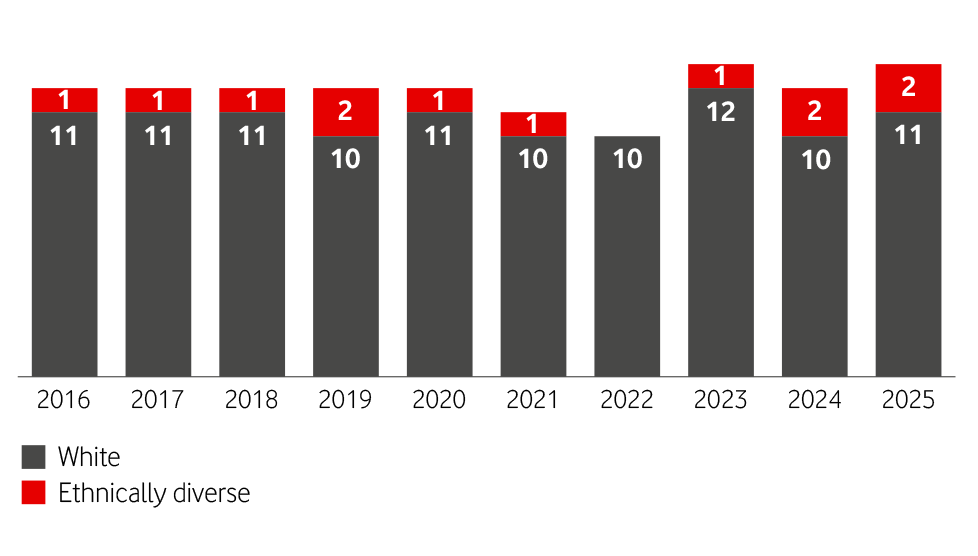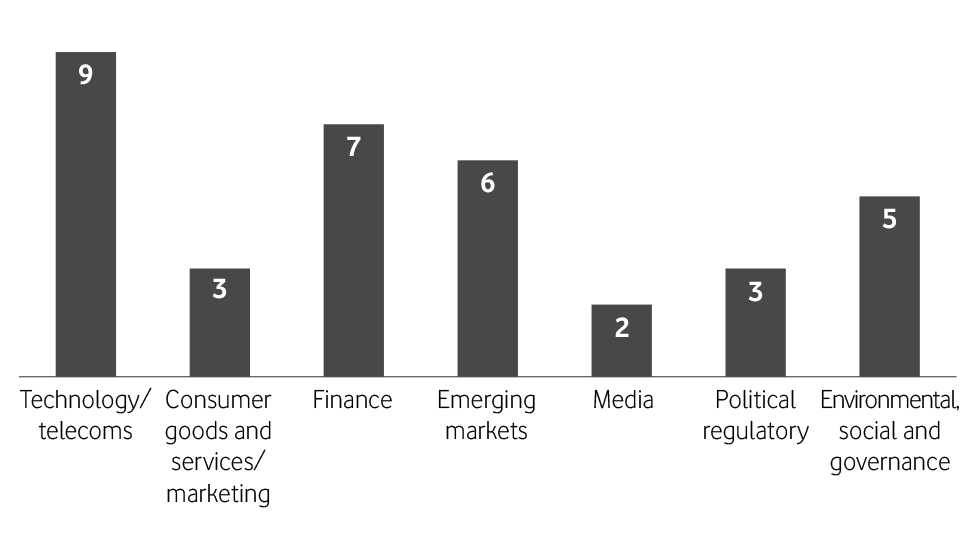Our governance approach
We firmly believe that strong corporate governance plays a crucial role in delivering long-term, sustainable value for shareholders and the wider world.
For that reason, governance informs every decision we make together: from formulating our overarching strategy and underlying purpose, to setting the tone of our company culture and instilling values that we can be proud of across the entire Group.
We are making rapid progress on our roadmap
Meet our Board of Directors and learn more about why they chose to join us, their experience, and their roles
Our Board
The Nominations and Governance Committee regularly reviews the Board’s composition to ensure a diverse mix of backgrounds, skills, knowledge and experience as well as deep expertise in technology and telecommunications. Each year, the Board monitors and improves its performance by conducting an annual performance review.

Ethnicity

Skills and expertise of Non-Executive Directors

Attendance
The table below details the Board and Committee meeting attendance during the year to 31 March 2025. The number of attendances is shown next to the maximum number of meetings the Director was entitled to attend. Ad hoc meetings of the Board and its Committees were able held as required during the year.
Notes:
1. David Nish was unable to attend one scheduled meeting of the Board due to ill health.
2. Michele Demaré was unable to attend one scheduled meeting of the Board and one scheduled meeting of the Remuneration Committee due to a diary conflict.
3. Simon Dingemans was appointed as a Non-Executive Director of the Board and joined the Audit and Risk Committee on 1 January 2025.
4. Deborah Kerr was unable to attend one scheduled meeting of the Board and one scheduled meeting of the Technology Committee due to a diary conflict.
Board evaluation
Progress in the year
The FY25 Board evaluation reported improvements had been achieved in:
- Operational excellence: Board agendas continue to be drafted with a focus on our strategic priorities across Customers, Simplicity and Growth.
- Workforce engagement and culture: Our designated workforce engagement leads attended employee forums throughout the year and the Chief Human Resources Officer presented cultural insights, including on Spirit and employee listening on an increased cadence this year. An update on people and strategic transformation was also provided at the September strategy session.
- Successful integration of the new e& representative as a Director: Hatem Dowidar has undertaken an extensive induction programme. The findings from the FY25 evaluation also concluded that the Board is functioning well and the dynamic has been strengthened following changes to the composition.
- Succession planning at Board and Senior Management level: Simon Dingemans was appointed as a Non-Executive Director on 1 January 2025 and subject to shareholder approval, Anne-Françoise Nesmes will be appointed as a Non-Executive Director following the conclusion of the 2025 AGM. Guillaume Boutin was appointed as CEO Vodafone Investments & Strategy on 15 May 2025.
Board Committee roles
The Board is responsible for the overall conduct of the Group’s business including: our long-term success; setting our purpose; monitoring culture and how it has been embedded; monitoring our values, standards and strategic objectives; reviewing our performance; and maintaining positive dialogue with our stakeholders. The Board has established five formal Committees to focus on specific areas.
Board Committee roles
The Board is responsible for the overall conduct of the Group’s business including: our long-term success; setting our purpose; monitoring culture and how it has been embedded; monitoring our values, standards and strategic objectives; reviewing our performance; and maintaining positive dialogue with our stakeholders. The Board has established five formal Committees to focus on specific areas.
Audit and Risk Committee
The Committee reviews the adequacy of the Group’s system of internal control, including the risk management framework and related compliance activities. The Committee also monitors the integrity of financial statements, reviews significant financial reporting judgements, and advises the Board on fair, balanced and understandable reporting and the long-term viability statement. The Committee also has joint responsibility, with the ESG Committee, for reviewing the appropriateness and adequacy of ESG disclosures provided within the Annual Report and the ESG Addendum, including the approval of their content.
Nominations and Governance Committee
The Committee evaluates Board composition and ensures Board diversity and a balance of skills,
as well as experience in ESG matters. The Committee also reviews Board and Executive Committee succession plans to maintain continuity of skilled resources, and oversees matters relating to corporate governance.
Remuneration Committee
The Committee sets, reviews and recommends the policy on remuneration of the Chair, executives and senior management team. The Committee also monitors the implementation of the Remuneration Policy, and oversees general pay practices across the Group.
ESG Committee
The Committee oversees the ESG programme and monitors the purpose agenda in relation to empowering people, protecting our planet and ensuring that Vodafone acts with integrity. The Committee monitors progress against key performance indicators and external ESG index results and oversees progress on ESG commitments and targets. The Committee also has joint responsibility, with the Audit and Risk Committee, for reviewing the appropriateness and adequacy of ESG disclosures provided within the Annual Report and ESG Addendum, including the approval of their content.
Technology Committee
The Committee supports the Board with fulfilling its oversight of the Company, specifically how technology underpins Company strategy, including assessing risks and exploring innovations for future growth. The Committee also monitors technology development, innovation, risks, disruptors and mitigations and reviews technology supply chains, partnerships and external relationships.
Regular engagement ensures we operate in a balanced and responsible way, both in the short and longer term
We are committed to maintaining good communications and building positive relationships with all our stakeholders, as we see this as essential to strengthening our sustainable business. We have summarised our interactions with key stakeholders during the year below.
Vodafone is required to provide information on how the Directors have performed their duty under section 172 of the Companies Act 2006 to promote the success of Vodafone, including how those matters and the interests of Vodafone’s key stakeholders have been taken into account by the Directors. The engagement mechanisms directly involving the Directors are indicated below with a B symbol.
We are committed to deepening engagement with our customers to develop long-term, valuable and sustainable relationships. We have hundreds of millions of customers across our global footprint, from individual consumers to large multinationals.
How did we engage with them?
- Digital channels, call centres and branded retail stores.
- Account managers, solution specialists and, for large accounts, executive level engagement.
What were the key topics raised?
- Fast and reliable fixed internet, wider mobile coverage and strong connectivity.
- Easy access to empowered, high-quality support and reduced resolution times for customer problems and queries.
- Better value for long-term customers and ensuring greater transparency around price changes.
- Connectivity with digital services, such as security and cloud,
- Understanding the potential benefits, and how SMEs can make the best use of the latest digital products and services.
How did we respond?
- Held Customer Experience (‘CX’) as our top priority, with our ‘Ask Once’ programme being rolled out across markets to deliver seamless service guarantee and access to help customers.
- Set up CX boards to regularly review customer pain points, and implement action plans with dedicated investment and senior management visibility.
- Conducted initiatives such as Spirit surveys and site visits to call centres in key regions.
- Used Gen AI for more personalised and comprehensive interactions through digital self-service and to enhance frontline digital experiences.
- Used integrated trade-in, flexible financing and second-life refurbished devices, increasing trade-in volumes and second-life refurbished devices, generating significant savings for customers.
- Offered support such as free data to customers in the Czech Republic affected by major Central European flooding.
- Continued progress towards closing the digital divide for people across Europe and Africa, prioritising the affordability of data for all.
- Partnered with AST SpaceMobile to make the world’s first space video call on a standard smartphone from a remote area in UK without coverage.
- Focused on understanding and improving business CX, including the needs and engagement preferences across customer segments and sales channels.
- Deployed and optimised digital channels for business customers enabling self-serve, seamless experience.
Our people are critical to the successful delivery of our strategy. It is essential that they are engaged and embrace our purpose and values. Throughout the year we focused on a number of areas to ensure that everyone is highly motivated, and we remained focused on wellbeing, diversity and inclusion, and employee engagement.
How did we engage with them?
- Regular meetings with managers.
- European Employee Consultative Committee.
- Vodacom Group Employee Engagement Forum.
- Executive Committee discussions.
- Internal website, live webinars, newsletters and other communications posted on our internal digital platform called ‘Viva Engage’.
- Employee Speak Up channel.
- Global employee surveys, including onboarding and exit surveys.
What were the key topics raised?
- Changes to our commercial portfolio.
- Company strategy.
- Generative AI.
- Results of employee listening and Spirit Beat survey.
- Hybrid working.
- Ownership and active engagement around safety, health and wellbeing, including mental health.
- Diversity and inclusion.
- Employee experience and engagement.
How did we respond?
- Updated employees on business and trading performance, regularly.
- Launched foundational Generative AI training for all employees.
- Delivered leadership training to support our Company transformation.
- Embedded our hybrid working policy.
- Continued to focus on opportunities identified in employee surveys.
- Developed a three-year global capability plan.
- Remained committed to safety, health and wellbeing.
- Continued to embed diversity and inclusion through attraction, retention, development, allyship and education.
We partner with over 8,000 suppliers to deliver the products and services that we need to deliver our strategy and connect our customers around the globe. These range from start-ups and small businesses to large multinational companies.
How did we engage with them?
- Regular collaborative performance review meetings with strategic suppliers.
- Forums, events, conferences, and site visits.
- ESG criteria incorporated into tender process, supplier selection and performance management.
- Supplier audits and assessments.
What were the key topics raised?
- Strategic and commercial delivery and performance.
- Supplier and product innovation.
- Human rights in the supply chain.
- Driving health and safety standards.
- Diversity and inclusion.
How did we respond?
- Collaborated with industry peers and supplier through the Joint Alliance for CSR (‘JAC’).
- Supply Chain Sustainability Finance Programme for driving environmental progress.
- Quarterly supplier safety forums.
- Identification of Corrective Action Plans (‘CAP’)s to protect human rights at supplier sites.
We believe that the long-term success of our business is closely tied to the success of the communities in which we operate. To achieve this, we engage with local communities and international NGOs across our markets.
How did we engage with them?
- Participation in industry working groups, such as those organised by the GSMA, on policy issues at national and international level (including digital inclusion, biodiversity, net zero).
- Participation in global multi-stakeholder coalitions established by the United Nations including the UN Broadband Commission for Sustainable Development and the ITU Partner2Connect alliance.
- Locally led direct NGO engagements and partnerships.
What were the key topics raised?
- Increasing access to connectivity and digital services, by closing the digital divide.
- Environmental topics including net zero, biodiversity and the circular economy.
- Human rights topics.
- Delivery of global and national development goals including the UN Sustainable Development Goals (‘SDGs’).
How did we respond?
- Provided affordable and accessible services, technology, and connectivity, through our everyone.connected campaign.
- Provided leadership in respect of closing the digital divide at the International Telecommunication Union’s SDG Digital event during the UNGA79.
- Partnered with industry working groups including Trussell, NSPCC and Good Things Foundation to help provide essential digital skills, connectivity and deliver social value.
- Engaged with industry working groups covering human rights, network access and digital inclusion.
As a heavily regulated industry and part of Critical National Infrastructure, our relationships with governments and regulators are crucial. We aim to collaborate on policies that impact our industry and service to customers, while fostering a deeper understanding among governments and regulators of our positive contributions to customers, the economy, the environment, and communities.
How did we engage with them?
- Held meetings with EU institutions, national, regional and local governments, regulators and international organisations.
- Participated in industry bodies, consumer alliances, and public-private initiatives.
- Hosted and attended workshops and events to enhance sector understanding of key issues.
- Sponsored the NATO Public Forum in Washington DC.
- Our Chair leads the European Round Table for Industrialists, engaging with European and global institutions and governments.
What were the key topics raised?
- The EU regulatory and policy environment, including a review of the Single Market. Spectrum and licensing, including prolongation of existing licence holdings.
- Security of critical infrastructure and supply chain resilience, from subsea cables to satellites.
- Protection of investments abroad and inward investment screening.
- Vodafone UK and Three merger approval.
How did we respond?
- Contributed to the Commission’s White Paper on EU Connectivity.
- Participated in three European Commission studies.
- Contributed to EU consultations.
- Responded to the 2025 Single Market Strategy Call for Evidence.
- Submitted policy responses to trade questions from the UK’s Department for Business and Trade.
Our investors include individual and institutional shareholders as well as debt investors. We maintain an active dialogue with our investors through our extensive investor relations programme.
How did we engage with them?
- Personal meetings, roadshows, conferences.
- Annual and interim reports and presentations.
- Our investor relations website is used as our primary digital communications tool and is available to all shareholders, including 11 hours of dedicated video content covering investor events and interviews with Board Directors.
- Regulatory News Service (‘RNS’) announcements.
- Annual General Meeting (‘AGM’).
- Investor perception study and regular feedback survey.
- Online presentations aimed at retail investors, in our ’Investor Meet Company’ in FY25.
- Our Registrar operates a portfolio service which provides shareholders with the ability to manage their holdings.
What were the key topics raised?
- Our strategic roadmap and strategic priorities of Customers, Simplicity and Growth.
- Allocation of capital, including capital investment, leverage and shareholder returns.
- Portfolio right-sizing for growth, market performance, and trading outlook.
- Corporate governance practices.
- Environmental, Social and Governance (‘ESG’) strategy, targets and reporting.
How did we respond?
- We conducted over 1,000 investor interactions through meetings with major institutional shareholders, debt investors, individual shareholder groups and financial analysts, and attended conferences.
- Meetings were attended by Directors and senior management, including our Chair, Group Chief Executive, Chief Financial Officer, and Executive Committee members.
- Provided comprehensive reports and transparency disclosures on ESG matters.
Managing uncertainty in our business
In today’s uncertain and volatile environment our business faces numerous risks. However, through robust processes and a strong risk culture, we effectively manage these challenges to achieve our
strategic objectives.
Governance and identifying our risks
The Board has the overall responsibility for establishing and maintaining an effective risk management framework. They also advise on the level of risk we are willing to take in achieving our strategic goals. The Audit and Risk Committee (‘ARC’), on behalf of the Board, reviews and approves the Group’s principal and emerging risks. The risk function aims to integrate risk considerations into strategy execution, enabling informed decision-making across our business. See diagram (Overview of the risk governance structure) for an overview of the governance structure. The global risk management framework standardises the way in which risk is managed across our operations. Our end-to-end approach starts with risk identification. As part of thisprocess, local markets and Group entities identify and evaluate risks to their local strategy. The Group risk team centrally assesses and challenges these risks. A comprehensive list of risks, along with external risk scanning findings and key risk drivers, are presented to the Directors and executives for analysis and identification of significant risks. The proposed principal (pages 55 to 57), watchlist, and emerging (page 58) risks are agreed by our Risk and Compliance Committee (‘RCC’) before being submitted to the ARC and the Board for review and approval.
Building a strong foundation
Managing risk is at the heart of business decision making and supports our objective to build a strong foundation for future success. That is why we continue to mature our global risk management
framework, promoting consistency across the markets in which we operate and enhancing our approach to managing risk across the Group. Over the course of the past year some of the key initiatives to evolve our global risk management framework included:
– Updating our global risk management framework to align closer with international standards and good practice as well as to reflect the changes to our risk management process;
– Review and refresh of our enterprise risk strategy with the aim to set clear future objectives and to prioritise key initiatives;
– Conducting a maturity assessment of our risk management framework and processes;
– Maturing the risk-based approach to assurance across the Group;
– Enhancing the process for assessing risk appetite and tolerance for the Group principal risks;
– Further evolving our approach to operational risk management across the Group, building a consistent framework for comparing risks;
– Continuing a number of initiatives associated with ESG, including quantitative climate scenario analysis, materiality assessments and programmes related to our disclosure obligations; and
– Strengthening the risk community across the organisation through a combination of digital and in-person training as well as risk awareness events.
Complying with the latest UK Corporate Governance Code
In 2018, a new UK Corporate Governance Code (the ‘Code’) was published, and as with previous iterations of the Code, we’re committed to ensuring compliance. We do this not only because it is our obligation, but because we share in the Code’s aims. Compliance enables us to foster better stakeholder engagement, greater diversity, more rigorous remuneration structures and a stronger corporate culture.

Board of Directors

Executive Committee

Our Board Committees
Our Board is collectively responsible for the oversight and success of our business. Through its committees, it ensures that the importance of compliance and integrity is recognised at all levels, throughout the Group.

Codes and compliance
In FY25, we were pleased to confirm that we complied in full with the principles and provisions of the UK Corporate Governance Code. We continue to do this while also complying effectively and transparently with other governance-related standards and guidelines.

